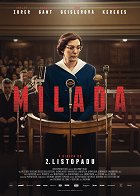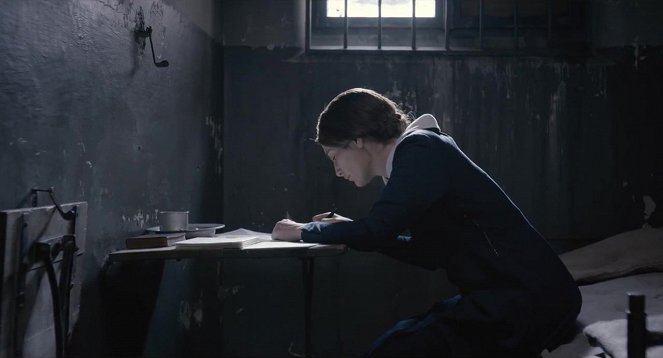Reżyseria:
David MrnkaZdjęcia:
Martin ŠtrbaObsada:
Ayelet Zurer, Robert Gant, Daniel Rchichev, Karina Rchichev, Taťjana Medvecká, Vica Kerekes, Igor Orozovič, Jaromír Dulava, Marián Mitaš (więcej)Opisy(1)
Tytułową bohaterką filmu Davida Mrnki jest Milada Horákova, doktor prawa, polityczka i działaczka na rzecz wolności i demokracji. Horákova walczyła w ruchu oporu podczas II wojny światowej, za co była więziona w obozie koncentracyjnym w Terezinie, a w czasach powojennych otwarcie występowała przeciwko reżimowi komunistycznemu. Za działalność wywrotową i szpiegowską została aresztowana i stracona w 1950 roku, choć o łaskę dla niej apelowali do prezydenta Klementa Gottwalda m.in. Albert Einstein, Winston Churchill i Eleanor Roosevelt. Film Mrnki to zapis kilkunastu lat życia Milady Horákovej, a zarazem pełen szacunku i podziwu dla bohaterki obraz niestrudzonej walki o wolność, godność i moralność. (Kino na hranici)
(więcej)Recenzje (4)
I didn’t want to be this critical, but I can’t help it. It is quite popular these days to open up political topics and tell the biographical stories of important personalities of our republic, or of former Czechoslovakia. And Milada Horáková is a topic with capital T. A topic that deserves respect, humility and a story that doesn’t have to be ashamed of itself. I am exaggerating here in my review. The film indeed doesn’t have to be ashamed of itself. But apart from a good technical execution and a more than solid actress from Israel, the movie lacks a screenplay that would give it at least a bit of sense. Personally, when I think about it, I have a problem with the fact that a debutant director was tasked with making a movie on this rather serious topic. Is Czech cinematography really so screwed that similar topics need to be assigned to a debutant director? Personally, I don’t think that David Mrnka is so bad, but I do think that he bit off more than he could chew here. Good moments alternate with truly bad moments and within the entire plot, it took a lot of effort to learn something about Milada. In the end, I didn’t learn anything new and it took a lot of work to convince myself to finish the movie. The only thing that we can all agree on is the portrayal of the typical Czech Communist, who for me is probable the most despicable human being in the world. And it doesn’t matter at all whether we are talking about communists from the past, or about communists today.
()
A sad look at the domestic perception of our own history in filmmaking. David Mrnka, a screenwriter and director in one, has transformed into the author of a ninth grade essay question. One in which most direct speech consists of sparse sentences or pseudo-dramatic slogans. When these types of mottos are delivered with the usual dull dubbing (a particularly sad paradox in Czech cinema), the quality of the acting is more or less nullified. The only one who manages to shine is the underestimated Vica Kerekes, while the judge Aňa Geislerová or Jiří Vyorálek's Gottwald as an avid vodka drinker are, without exaggeration, in the category of parody. Milada herself, portrayed by Ayelet Zurer, works as an actress, but what she is forced to say is so absurdly profound that even she fails to handle it. When she melodramatically utters "Communists are like Nazis..." at a moment intended to be pivotal, all that's missing is a mischievous wink to the camera. It was not clear to me until the end whether the film was supposed to be four hours long and a lot had to be cut, or if Mrnka printed three pages of text from Wikipedia and just ticked off each item. Otherwise, I cannot explain absurd moments like "the main heroine is sentenced to prison, only to cheerfully return home in the following scene". Those who knew something about Milada Horáková before the start of the film will be disappointed, and those who knew nothing will end up with a helluva mess.
()
I totally agree that the existence of a film about Milada Horáková is necessary and essential. I’ll give it a star for the fact that someone tried to make one. But I can't do much more than that because cinematically it was one big dud that didn't touch me despite the strong story the filmmakers were trying to tell. I hope and believe that this topic is not yet closed to the cinematic world.
()
What I appreciate most about Mrnka's Milada is that it was created outside the traditional Czech structures. Seemingly, it is a Czech film like any other, with Geislerová in a smaller role, Chýlková in a bigger one, Medvecká, Kerekes, Javorský, Mihulová, Dobrý... but the Horáks are Ayelet Zurer and Robert Gant, which was a very good move. The theme is handled without the oversight of classic Czech backward-looking institutions, with the main investors being Netflix, EFB and DFG. There is nothing to doubt here.
()

